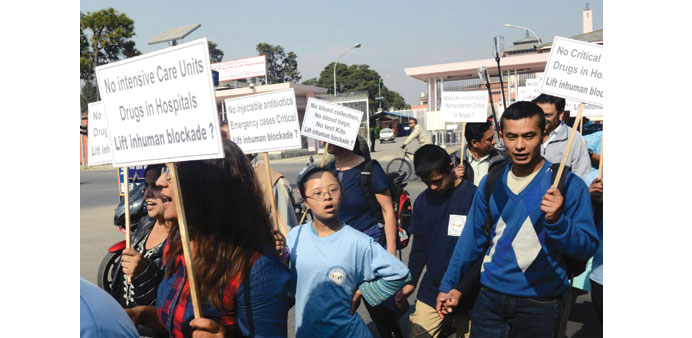Nepalese activists and hospital patients rally against the block on humanitarian supplies at the Nepal-India border in Kathmandu yesterday. Nepal is heavily dependent on India for fuel and other supplies, but little cargo has crossed the border from India since protests against the constitution broke out in late September.
AFP
Geneva
The United Nations yesterday called for an independent probe into deadly unrest in Nepal sparked by a controversial new constitution, with 50 killed since violence first erupted in August.
Four died in the latest clashes, which broke out late Saturday in the southeastern district of Saptari, pitting police against demonstrators from the Madhesi ethnic minority who say the constitution introduced in September leaves them
politically marginalised.
“There is a clear need for an independent investigation to establish the facts and to bring all perpetrators of violence to justice,” UN rights agency spokeswoman Ravina Shamdasani told journalists in
Geneva.
She said the United Nations had confirmation of at least four people being killed in clashes over the weekend, after initial reports of two dead.
The UN rights agency has also received reports of protestors at the weekend throwing stones at police, who responded with live ammunition.
Separately, the UN has received allegations that police stormed the Sagarmatha hospital where victims of the unrest were being treated and assaulted patients and hospital staff, Shamdasani said.
“We have been urging Nepalese authorities to ensure that existing ... standards on the appropriate use of force are fully respected,” she told reporters.
“Unfortunately, reports suggest that these steps do not appear to have been taken,” she added, while calling on protesters to also renounce violence.
The police chief in Saptari, Bhim Dhakal, said that the area was calm yesterday and that a previously imposed curfew had been lifted.
The protests had forced buses off the road and led to school closures, but the head of the Nepal’s education department, Dilli Ram Rimal, said yesterday that all schools had reopened “as of today.”
The demonstrators have been blocking the main Birgunj border crossing with India for two months, stifling the flow of fuel and other vital supplies.
With Nepal heavily reliant on India for crucial imports, medical supplies are running dry and a nationwide fuel shortage is deepening.
“Any obstruction of essential supplies and services is a serious violation of international human rights law,” said Shamdasani, echoing a call from UN Secretary General Ban Ki-moon for the blockage to end.
Nepal’s government accuses India, which has criticised the new constitution, of imposing an “unofficial blockade”.
New Delhi has denied the charge and urged dialogue with the protesting Madhesis, who have close cultural, linguistic and family ties to Indians living across the border.
Shamdasani stressed the importance of further talks, guided by Nepal’s National Human Rights Council.
But several rounds of talks between the government and the protesting parties have failed to reach an agreement.
The constitution, the first drawn up by elected representatives, was meant to cement peace and bolster Nepal’s transformation to a democratic republic after decades of political instability and a 10-year Maoist insurgency.

